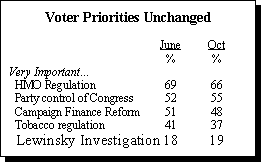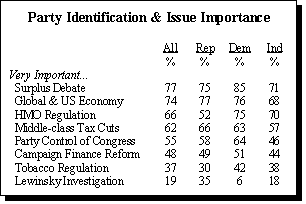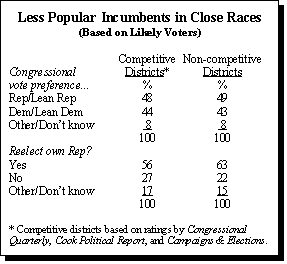Who’s Voting
Although turnout may be slightly lower this year than in 1994, there are no substantial differences in the composition of those most likely to go to the polls. As in the last midterm election, voters will be disproportionately older (49% over age 50, just 9% of those under 30), better educated and more affluent. Reflecting the relatively close margin in congressional preferences, the base of likely voters is evenly divided between Republicans and Democrats this year — 35% in each party, compared to a 40% vs. 30% Republican advantage in October 1994.
Patterns of Support
As in 1994, among likely voters Republicans continue to hold a strong advantage among white men (56% vs. 35% for Democrats). But while women were divided evenly between the two parties in October 1994, Democrats today have a 48%-41% edge among women.
One of the biggest differences from the 1994 election is Clinton’s relatively high job approval. Currently, the voters most likely to go to the polls approve of Clinton by a 58%-39% margin, while in 1994 likely voters disapproved 39%-56%. With the Clinton ratings closely tied to congressional voting preferences (69% of those who approve say they will vote for a Democrat), the president’s strong approval ratings even amid the prospect of impeachment may be helping Democrats.
Opinion of Congress Sours
Although there has been no significant change in party preference on the generic ballot measure, public sentiment toward Congress has dipped in recent weeks, as has support for incumbents and the Republican congressional leadership. However, most of the fall-off is within traditional Democratic constituencies already inclined to vote with their party in the fall. Similarly, increased animosity toward Clinton comes mainly from those already inclined to vote Republican.
As Congress prepares to complete its legislative business for the year, the percentage of Americans saying it has accomplished less than previous Congresses is up significantly from earlier this year. Nearly one-in-four voters (23%) now hold this opinion, compared to 17% in early September and 15% in August. A plurality of voters (49%) think this Congress has accomplished about the same amount; 24% say it has accomplished more. Among those who say Congress has accomplished less, more than half say the Republicans are to blame, 19% blame Clinton, and 5% blame Democratic congressional leaders.
Approval ratings for Republican leaders in Congress slid somewhat in October, with the voters now disapproving of the job they are doing by 48%-42%. In early September, approvers outweighed disapprovers — 45%-39%. The GOP has lost the most ground among women, blacks and Democrats.
Incumbents less Popular

At the same time, support for congressional incumbents has fallen off the near-record high levels recorded earlier this year. Today, 58% of registered voters would like to see their own member of Congress reelected, compared to 63% in September and 66% in January of this year. Some 39% would like to see most members reelected, compared to 46% a month ago. Here the decline is most dramatic among blacks, Democrats and those with less than a high school education.
Not surprisingly, 55% of those who plan to vote Republican this fall would like to see most incumbents reelected in the House, compared to only 33% of those who plan to vote Democratic. Among crucial swing voters, support for incumbents is relatively weak: 24% would like to see most incumbents reelected; 43% would not.
Nonetheless, incumbents remain in a stronger position than they were at a comparable point in 1994. In the weeks leading up to the Republican takeover of the House, only about half of registered voters (55%) said their own member should be reelected; 31% thought most members should stay in office. Similarly, voters are less inclined today than they were in 1994 to say having new faces in office is more important than having experienced people who know how the government works.

Partisan control of Congress has become a more important issue for voters in recent weeks. Fully 47% say the question of which party controls Congress will be a factor in their vote this fall; 49% say it will not. In September, 56% of voters said partisan control would not be a factor. Republican and Democratic voters are equally likely to cite party control as important.
Similarly, Bill Clinton has become more salient in voters’ decision-making than he was just a month ago. In September, 63% said the President would not be a factor in their vote for Congress. Today, that number has fallen to 52%. More people now characterize their vote as a vote against Clinton — 23% vs. 16% in September. This sentiment has increased the most among men and Republicans. Fully 48% of Republicans now say they think of their vote for Congress as a vote against Clinton.
Congress’ Handling of the Scandal
These marginal shifts in sentiment away from incumbents and the GOP leadership may reflect a backlash against the Republicans for their handling of the Clinton-Lewinsky investigation. Clinton’s approval rating remains high (62%) and the public continues to overwhelmingly oppose his impeachment — 62% of voters say, based on what they know at this point, the president should not be impeached and removed from office; 32% say he should be. Most voters (52%) think the Republicans in Congress have pushed too hard for Clinton’s impeachment. Even 22% of Republicans share this view. Only 9% of voters say the GOP hasn’t pushed hard enough; 35% say they have handled the situation about right.
Women, blacks and those with less income and less education are among the most likely to think the Republicans have pushed too hard. Voters from competitive districts do not differ from those in non-competitive districts on this score. Among the most likely voters, half (48%) say the GOP has pushed too hard for the president’s impeachment.
Voters are more approving of Democratic members’ handling of the issue. A plurality (42%) think Democrats have been loyal enough to the president; 27% think they should have shown more loyalty. Just 23% say Democrats have been too loyal to Clinton.

General attitudes about the Clinton-Lewinsky scandal and Congress’ handling of the matter continue to divide largely along partisan lines. Nearly half of the public (48%) has a great deal or a fair amount of confidence that Congress will reach the right decision about whether or not to impeach Clinton; an equal proportion (48%) has little or no confidence. Similarly, 47% of voters have a favorable opinion of members of Congress who voted to go forward with an impeachment inquiry; 49% have a negative opinion of those members. Republicans are much more likely to have confidence in Congress to reach the right decision (68% vs. 35% of Democrats) and to have a favorable view of those members who voted to proceed with an impeachment inquiry (77% vs. 22% of Democrats).
While most voters (55%) say a candidate’s likely position on impeachment will not be a factor in their vote for Congress, a large minority (40%) say it will be a factor. Those who say the issue matters favor Democrats over Republicans in the generic ballot by 52%-to-37%, while those who say the issue won’t make a difference back Republicans over Democrats 47%-to-39%.
Talk of Education; Concern for Economy
Although half of voters report following Congress’ decision to begin an impeachment inquiry very closely, only 19% say the Clinton-Lewinsky investigation is very important for the nation and few express interest in making Clinton a campaign issue. Only 3% say that they want candidates to talk about Clinton and just 4% name the president as the most important problem facing the country today. Instead, education and economic issues top t he list of voter concerns.
Moreover, although voters continue to express the greatest interest in hearing candidates talk about education, they are most concerned about the state of the economy. Almost one-fourth (24%) say they want candidates to address educational issues in the campaign; only 9% rank it as the most important problem facing the nation. Instead, 27% cite economic issues as the most important problem facing the country. Concern about the economy is up 11 percentage points since May, when 16% of voters mentioned it.
There are other signs that voters’ confidence in the economy has ebbed somewhat since just last month. Today, 59% of voters say they expect to be better off financially next year, down from 66% in early September. The greatest drop in optimism occurred among senior citizens, voters without high school diplomas, Easterners, and voters living in rural states. Conversely, voters who live in regions of the country where the technology and communications industries are prominent are among the most optimistic about their personal financial prospects for the coming year.
Rising concern about the future is not limited to personal expectations. More voters now say that they expect economic conditions in the country to be worse a year from now than said so in early September (22% vs. 17%, respectively). Although the fall-off has occurred among voters of every demographic and political group, white men, college graduates and the wealthy express more pessimism (28%, 27%, and 29%, respectively).
Economic and Financial Issues Overshadow Scandal
Concern about the economy is also reflected in the priority voters attach to government economic policies. Three-quarters rank the debate in Washington over how to use the budget surplus (77%) and U.S. efforts to ease worldwide financial instability and maintain a strong domestic economy (74%) as very important issues.

Indeed, most voters place policy concerns over political issues. Two-thirds (66%) see regulation of health maintenance organizations as very important; 62% rank proposals for middle-class tax cuts this high. Party control of Congress and campaign finance reform (55% and 48% respectively) are lower on the list of very important issues. Government efforts to regulate the sale of tobacco products is considered very important to the nation by only 37% of voters.
There has been almost no change in voters’ attitudes concerning the importance of these issues over the past four months. In June, 69% ranked HMO regulation very important, about half considered control of Congress and campaign finance reform very important, 41% saw tobacco regulation that way, and 18% gave this ranking to the Clinton-Lewinsky investigation.

Broad consensus on the importance of these issues even extends to competitive districts and across partisan lines, with two notable exceptions: Voters who support Democratic candidates differ from those who favor the GOP in the importance they assign both HMO regulation and the Starr investigation.
Three-quarters (75%) of Democrats see regulation of HMOs as very important, compared to 52% of Republicans who agree. Independents are closer to the Democrats, with 70% ranking this issue very important. Conversely, while the Lewinsky investigation is hardly on the radar screen of most Democrats, 35% of Republicans see it as a very important issue (compared to just 6% of Democrats and 18% of Independents).
Moreover, there are also differences between those who are most likely to go to the polls on Election Day and average voters: 64% of likely voters rank the outcome of the 1998 elections as very important and 57% see campaign finance reform as such — compared to 55% and 48%, respectively, of all voters.
Local Issues Most Important in Closest Races

Among likely voters, Republicans have a slight edge in both competitive and non-competitive congressional districts. Even in the 105 races predicted to be the closest on Election Day, state and local issues rank above national issues. Registered voters in competitive districts say party control of Congress will not be a factor in their vote by a 52%-to-44% margin, while those in non-competitive districts are more evenly divided (48%-to-48%). Similarly, majorities in competitive and non-competitive districts say a candidate’s likely position on impeaching Clinton will not be a factor in their vote.
Reflecting the more heavily-contested nature of the competitive seats, incumbents have slightly less support in these districts. Just 56% of likely voters in competitive districts say their own representative should be reelected, compared to 63% in non-competitive seats.